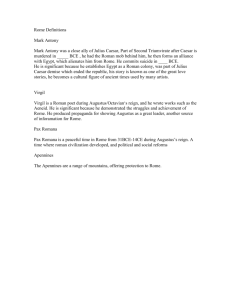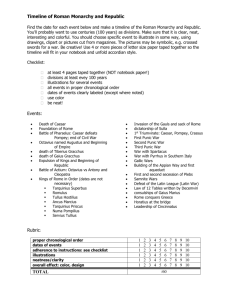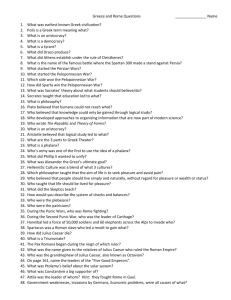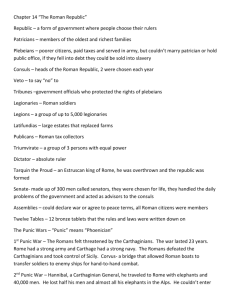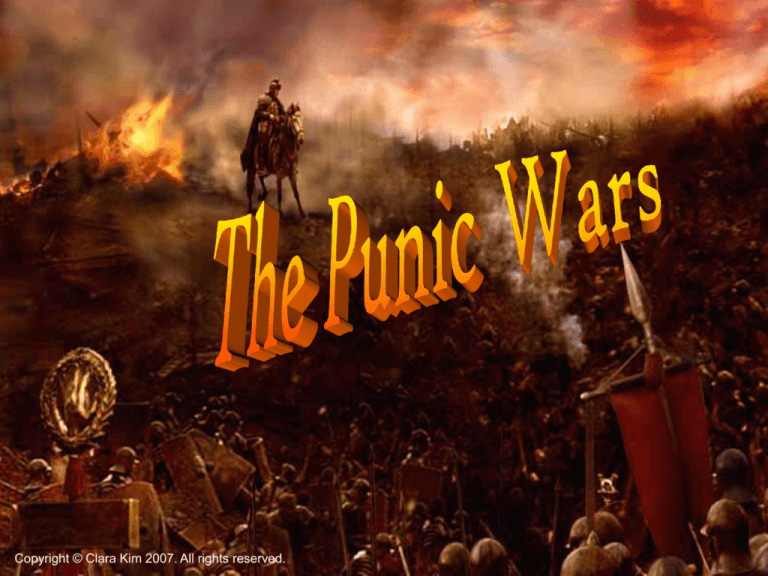
Copyright © Clara Kim 2007. All rights reserved.
Roman Legion
• Divided into
infantry and
cavalry
• 5,000 Soldiers
• Every citizen
had to serve
for 10 years
Roman Legion
• Divided into smaller groups
of 80 men called a century
Roman Power Grows
• Roman power
grew slowly
and steadily
• Eventually
conquered all
of Italy
The Defeated People
• Rome was lenient to the
people they conquered
–They were allowed to
be full citizens if they
lived on the Tiber
–Those who lived
further away had
citizenship but could
not vote.
The Punic Wars
• Eventually Rome
and Carthage
began to fight
over trade in the
Mediterranean
Sea
• They fought 3
battles
The First Punic War
• Fought over
Sicily for 23
years
• Carthage lost
• This was
Rome’s first
province
The Second Punic War
• Carthage was led by
HANNIBAL a
brilliant general.
• He used 50,000 men,
9,000 cavalry and 60
elephants.
• To surprise Rome he
went through the Alps
The Second Punic War
• For 10 years he
pillaged northern
Italy
• Finally a Roman
general name
SCIPIO defeated
Hannibal.
The Third Punic War
• By this time, Carthage
was no longer a threat.
• Cato a influential
senator reminded them
of the terror Hannibal
laid on Italy.
• Romans destroy
Carthage and sold all
of Carthaginians into
slavery!
Rome In Control
• Victory in the Punic Wars
gave Rome control of the
Mediterranean
From Republic to
Empire
Copyright © Clara Kim 2007. All rights reserved.
After the Punic Wars
• Increasing wealth and expanding
empire brought many problems
• The most serious problem was
the widening gap between the
rich and the poor.
1
• Thousands of slaves were
captured and made to work on
Latifundias = huge estates.
2
• Thousands of Soldiers returned from
war without jobs or homes.
• They moved to cities like Rome to
find work.
• They became part of the poor class.
Two Brothers
• Tiberius and Gracchus
tried to help Rome’s
poor by proposing to:
– Give land to the poor
– Limit the size of estates
(latifundias)
• The senators felt
threatened and the two
brothers were murdered
3
• Rich Romans
became corrupt
with money and
luxury and
tensions between
the rich and the
poor caused a
civil war!
Julius Caesar
• Eventually an
ambitious
and daring
leader
emerged to
bring order to
Rome
Triumvirate
• The First Triumvirate = Julius
Caesar, Crassus and Pompey
• Triumvirate = a group of three
leaders working together in
government
• He conquered all of Gaul in
France
Caesar’s Reforms
• He became the
absolute ruler of Rome
= he had total power.
• He expanded the
Senate by adding his
friends
• Created jobs for the
poor and expanded
land
• Raised pay for soldiers
Caesar’s Assassination
Why did Julius Caesar have enemies
among the rich and powerful?
• Military victories = very popular with the Romans.
• His soldiers were very loyal to their leader so Senate
was afraid of his popularity and power.
• Pompey and some senators tried to take over power
and Caesar defeated Pompey.
• After the civil war, Caesar was given more power.
Why did Julius Caesar have enemies
among the rich and powerful?
• Senators didn't trust anyone who wanted
to be a dictator and take their power. They
thought he was trying to end the Republic.
• Caesar tried to get control of the senate by
adding more senators who were loyal to
him. Therefore, the senators felt their
power was slipping even further.
• He granted citizenship to many Greeks.
This made many Roman citizens angry.
Rise of Imperial Rome
• Octavian = adopted son of Caesar
defeats Mark Antony (Caesar’s best
general)
• Accepts title of Augustus = “exalted
one” and becomes Rome’s first
Emperor.
• During his rule Rome enters a time of
peace and prosperity known as the
Pax Romana or “Roman Peace”
The Age of Augustus
(Imperial Rome)
A Vast and Powerful Empire
• Octavian the adopted son of
Julius Caesar accepts the
title Augustus (exalted one)
• During his rule, Rome
reaches its peak in power
and reaches a time of great
peace
• From 27 B.C. to 180 A.D
there will be a period of 207
years of peace called the
Pax Romana
Economy during Pax Romana
• Agriculture is the most
important industry of the
Roman empire
• Whole empire used uniform
silver coin called a denarius
which made trade easier
• Had a huge network of
roads that connected all the
way to Persia and Russia
• Created prosperity and
stability
Government of Pax Romana
• Augustus was a great
emperor who:
– stabilized the frontier
– glorified Rome with splendid
public buildings
– Set up a civil service
• A civil service paid workers
from the Plebeian class to:
– Manage grain supply
– Collect taxes
– Manage a postal system
• Government was very stable
Emperor Succession
• Peace and prosperity
depended on orderly
transfer of power
• There was no written law
for how to transfer the
emperor’s power when he
died
• Five good emperors
solved this problem only
for a little time.
Pictures Cited
•
•
•
•
•
•
•
•
•
•
•
•
•
•
Slide 1 – http://www.crystalinks.com/punicwars.jpg
Slide 2 – http://i.imdb.com/Photos/Ss/0172495/2, http://italophiles.com/images/wbreem8.jpg
Slide 3 – http://www.krescendo.com/gladiatorlatin/script/english/gladiator_files/image001.jpg,
http://www.terragalleria.com/images/italy/ital7334.jpeg, http://www.englishheritage.org.uk/upload/img/04663_-_roman_helmet.jpg
Slide 4 – http://home.hetnet.nl/~sebas-vero/Trapani-Italy%20map.jpg
Slide 5 – http://i.imdb.com/Photos/Ss/0172495/1
Slide 6 – http://ecx.images-amazon.com/images/I/519M406S5DL._AA280_.jpg
Slide 7 – http://upload.wikimedia.org/wikipedia/commons/thumb/0/0e/Carthage-1958PortsPuniques.jpg/800px-Carthage-1958-PortsPuniques.jpg
Slide 8 – http://www.bible-history.com/rome/map_punic_wars.gif
Slide 9 – http://www.valleygames.ca/images/HannibalBoxFinal.jpg
Slide 10 – http://www.ibabuzz.com/hayword/wp-content/uploads/2007/01/hannibal.jpg
Slide 11 – http://www.sbceo.k12.ca.us/~vms/carlton/hannibal3.jpg
Slide 12 – http://www.copia-diarte.com/kunst/anonymous/bust_roman_general_publius_co_hi.jpg
Slide 13 –
http://www.romanempire.net/romepage/images/ArtGallery/RomeandRomans1/Carthage.JPG
Slide 14 – http://members.tripod.com/kevinashbrook/venice.jpg


